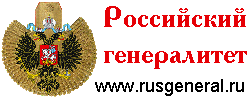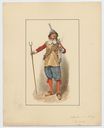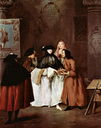Здравствуйте, гость ( Вход | Регистрация )
| Kirill |
 7.9.2007, 8:57 7.9.2007, 8:57
Сообщение
#1
|
 Source owner    Группа: Администраторы Сообщений: 33 356 Регистрация: 20.2.2007 Пользователь №: 1 Город: Санкт-Петербург Военно-историческая группа (XIX): Л-Гв. Преображенский полк Военно-историческая группа (XVIII): Л-Гв. Преображенский полк, 1709 Репутация:  252 252  |
-------------------- Эй, радетель за счастье реконструкторское, а Гогеля когда разрешат? |
  |
Ответов
| leon |
 17.9.2007, 21:46 17.9.2007, 21:46
Сообщение
#2
|
 Новичок  Группа: Пользователи Сообщений: 714 Регистрация: 6.8.2007 Пользователь №: 945 Город: Москва Военно-историческая группа (XIX): 9-й легкий полк Репутация:  50 50  |
Александр Мекаберидзе - грузинский историк, в 2000 г. эмигрировавший в США, защитил кандидатскую диссертацию по биографии П.И. Багратиона, планировалось её издание в виде монографии под заглавием "Lion of the Russian Army: Life and сareer of Peter Bagration", в настоящее время Мекаберидзе преподаёт в государственном университете Флориды. Автор фундаментального биографического справочника по русским генералам 1792 - 1812 гг. "The Russian officer core in the Revolutionary and the Napoleonic Wars. 1792 - 1815" (N.-Y., 2005. 534 p.) - лучшее издание по теме (отечественные аналоги проигрывают как в объёме, так и в качестве материала), а для западной историографии настоящее событие, по словам автора, работая над данным трудом он освоил огромный массив архивных источников в архивохранилищах России, стран Западной Европы и США. В 2006 г. он стал одним из авторов англоязычного трёхтомного справочника по истории периода Революции и наполеоновских войн. Автор в 2005 г. перевёл на английский воспоминания А.П. Ермолова, благодаря чему "открыл" для англофонов сей ценный источник.
На русском, насколько я знаю, его работы не издавались. Вот интервью А. Мекаберидзе (пардон, что на аглицком, переведу чуток позже.) Alexander Mikaberidze is the author of The Russian Officer Corps in the Revolutionary and Napoleonic Wars, 1792-1815 (ISBN 1-932714-02-2; 820 biographies, 440 b&w portraits, 38 charts, tables, and graphs, 534 pages, hardcover, dust jacket, 7 x 10). The book contains more than 800 biographical sketches of Russian officers and is based upon years of research in a variety of Russian and European archives. Mikaberidze sat down recently with Sarah Stephan of Savas Beatie LLC to share his passion for the Napoleonic period and what he hopes readers will gain from his work. Q: What draws you to Napoleon and this particular period in Russian history? A: For as long as I can remember, I have been fascinated with Napoleon’s personality. The first two books I read on Napoleon, by Eugene Tarle and Albert Manfred were so well written, I found myself immersed in a new world. I grew up in Georgia (formerly part of the Soviet Union) which was torn by civil wars. I searched for books written in Georgian, my native language, but only found one: Napoleon’s memoirs. Because of this, I started working on a book in Georgian that described Napoleon’s rise to power. Q: How did your research lead to writing The Russian Officer Corps? A: During research for my first book, I met scholars at Tbilisi State University in Georgia who were also interested in Napoleon. In 1999, a group of us established the Napoleonic Society of Georgia and conducted a few seminars. The next year, we even convened an International Napoleonic Congress in Georgia! Although my first degree was in international law and I served in the Ministry of Foreign Affairs in Georgia, my interest in Napoleon soon changed my life. Q: How so? A: While presenting a paper at Napoleonic Congress in Israel, I met two people who were students at the Institute on Napoleon and the French Revolution at Florida State University. At the time I was living in Georgia with a salary of $17 and never imagined actually moving to Florida, but in 2000, I received a full scholarship to study at the Institute from the director, Professor Donald D. Horward. It was a dream come true for me. Q: I can imagine it was! Can you describe for our readers your experience moving to the United States? A: Well, I arrived in Florida on August 15, 2000, Napoleon’s 231st birthday! Q: That sounds like a good start! A: Yes. It was a decisive move that not only led to me writing The Russian Officer Corps, but also impacted my entire life. Thanks to Horward’s invitation, I met my wife in the United States. Studying the Napoleonic period at the Institute was a great experience, in part because of the work I did with other students. We held Napoleon seminars where we discussed every aspect of Napoleonic Europe in great detail. My decision to write The Russian Officer Corps emerged out of these discussions. Что касается работы Уртуля по Бородину - по моему мнению - х-ня, да, действительно, автор работал во французских архивах, нарыл некоторые новые материалы (которые использовали в частности Попов и Васильев), но в целом всё равно очень поверхностно, а по русской армии - так и вообще позорище, пересказ французского перевода Бутурлина. |
Сообщений в этой теме
 Kirill Земцов В.Н. "Французское" Бородино (французская историография Бородинского сражения) 7.9.2007, 8:57
Kirill Земцов В.Н. "Французское" Бородино (французская историография Бородинского сражения) 7.9.2007, 8:57
 Николай Н. К сожалению 2-я страница не читается. Пишет - Insu... 11.9.2007, 11:18
Николай Н. К сожалению 2-я страница не читается. Пишет - Insu... 11.9.2007, 11:18

 Kirill
К сожалению 2-я страница не читается. Пишет - Ins... 11.9.2007, 13:10
Kirill
К сожалению 2-я страница не читается. Пишет - Ins... 11.9.2007, 13:10
 konstantyn_lvk К коллегам, занимающимся схожей тематикой. Со врем... 11.9.2007, 23:02
konstantyn_lvk К коллегам, занимающимся схожей тематикой. Со врем... 11.9.2007, 23:02
 Kirill Я "ЗА". 12.9.2007, 7:40
Kirill Я "ЗА". 12.9.2007, 7:40

 Eman Digby Smith, ”Napoleon against Russia” (Pen & ... 12.9.2007, 19:11
Eman Digby Smith, ”Napoleon against Russia” (Pen & ... 12.9.2007, 19:11
 konstantyn_lvk Однако же любопытные отклики на "Наполеона пр... 13.9.2007, 10:33
konstantyn_lvk Однако же любопытные отклики на "Наполеона пр... 13.9.2007, 10:33

 тень
что цитирует воспоминания главным образом немецк... 15.9.2007, 15:46
тень
что цитирует воспоминания главным образом немецк... 15.9.2007, 15:46

 Борис Александр Микаберидзе недавно опубликвал свою книг... 17.9.2007, 18:46
Борис Александр Микаберидзе недавно опубликвал свою книг... 17.9.2007, 18:46

 Guillaume Dode de la Brunerie
Александр Микаберидзе недавно опубликвал свою кни... 17.9.2007, 19:35
Guillaume Dode de la Brunerie
Александр Микаберидзе недавно опубликвал свою кни... 17.9.2007, 19:35

 Борис
А была на русском? :huh: Возможно, что я что-то ... 17.9.2007, 19:46
Борис
А была на русском? :huh: Возможно, что я что-то ... 17.9.2007, 19:46

 Eman Right to the point!
Respectfully,
Eman 17.9.2007, 20:25
Eman Right to the point!
Respectfully,
Eman 17.9.2007, 20:25
 Guillaume Dode de la Brunerie Увидела свет работа г-н Уртуля, посвященная непоср... 17.9.2007, 18:35
Guillaume Dode de la Brunerie Увидела свет работа г-н Уртуля, посвященная непоср... 17.9.2007, 18:35

 konstantyn_lvk
Увидела свет работа г-н Уртуля, посвященная непос... 17.9.2007, 19:18
konstantyn_lvk
Увидела свет работа г-н Уртуля, посвященная непос... 17.9.2007, 19:18

 Макс
Hourtoulle F.-G. Borodino - La Moskowa: La batail... 19.9.2007, 13:12
Макс
Hourtoulle F.-G. Borodino - La Moskowa: La batail... 19.9.2007, 13:12

 Guillaume Dode de la Brunerie
Автор фундаментального биографического справочник... 17.9.2007, 22:47
Guillaume Dode de la Brunerie
Автор фундаментального биографического справочник... 17.9.2007, 22:47
 konstantyn_lvk
Любопытно. Допустим, отечественных аналогов и вов... 18.9.2007, 7:13
konstantyn_lvk
Любопытно. Допустим, отечественных аналогов и вов... 18.9.2007, 7:13

 Eman
По своей основной профессии, Др. Ф.-Г. Уртуль (р... 19.9.2007, 5:01
Eman
По своей основной профессии, Др. Ф.-Г. Уртуль (р... 19.9.2007, 5:01

 rustveli Dobrii den,
Xotya ia prosmatrivaiu forum davno, n... 19.9.2007, 17:36
rustveli Dobrii den,
Xotya ia prosmatrivaiu forum davno, n... 19.9.2007, 17:36

 leon
P.S. Spasibo za moiu biografiu i dobruyu otsenku.... 19.9.2007, 18:56
leon
P.S. Spasibo za moiu biografiu i dobruyu otsenku.... 19.9.2007, 18:56


 rustveli
Уважаемый Александр! Прошу прощения за допущ... 19.9.2007, 19:46
rustveli
Уважаемый Александр! Прошу прощения за допущ... 19.9.2007, 19:46

 konstantyn_lvk
Dobrii den,
Xotya ia prosmatrivaiu forum davno, ... 20.9.2007, 0:08
konstantyn_lvk
Dobrii den,
Xotya ia prosmatrivaiu forum davno, ... 20.9.2007, 0:08

 rustveli
Александр, да ничего особенного, транслит у нас в... 20.9.2007, 1:04
rustveli
Александр, да ничего особенного, транслит у нас в... 20.9.2007, 1:04

 konstantyn_lvk
Александр, да ничего особенного, транслит у нас ... 20.9.2007, 1:48
konstantyn_lvk
Александр, да ничего особенного, транслит у нас ... 20.9.2007, 1:48

 rustveli
Ваш прекрасный город я к сожалению посетил лишь е... 20.9.2007, 2:51
rustveli
Ваш прекрасный город я к сожалению посетил лишь е... 20.9.2007, 2:51
 konstantyn_lvk
То есть справочник учитывает всех лиц, носивших г... 19.9.2007, 8:24
konstantyn_lvk
То есть справочник учитывает всех лиц, носивших г... 19.9.2007, 8:24

 leon
То есть справочник учитывает всех лиц, носивших ... 19.9.2007, 17:21
leon
То есть справочник учитывает всех лиц, носивших ... 19.9.2007, 17:21

 Eman 2 Konstantin and Leon - osoznal, zamechaniya prini... 19.9.2007, 20:16
Eman 2 Konstantin and Leon - osoznal, zamechaniya prini... 19.9.2007, 20:16


 konstantyn_lvk
2 Konstantin and Leon - osoznal, zamechaniya prin... 19.9.2007, 22:44
konstantyn_lvk
2 Konstantin and Leon - osoznal, zamechaniya prin... 19.9.2007, 22:44

 konstantyn_lvk
Именно. Я говорил именно о биографических справо... 19.9.2007, 23:05
konstantyn_lvk
Именно. Я говорил именно о биографических справо... 19.9.2007, 23:05
 тень У меня вопрос по книге А.Микаберидзе : а есть там ... 20.9.2007, 8:27
тень У меня вопрос по книге А.Микаберидзе : а есть там ... 20.9.2007, 8:27
 rustveli
У меня вопрос по книге А.Микаберидзе : а есть там... 20.9.2007, 10:01
rustveli
У меня вопрос по книге А.Микаберидзе : а есть там... 20.9.2007, 10:01
 тень
У меня вопрос по книге А.Микаберидзе : а есть та... 20.9.2007, 10:05
тень
У меня вопрос по книге А.Микаберидзе : а есть та... 20.9.2007, 10:05
 rustveli
Здорово.А "патретов" нет? :)
~ 400 p... 20.9.2007, 18:37
rustveli
Здорово.А "патретов" нет? :)
~ 400 p... 20.9.2007, 18:37
 тень
~ 400 portretov:)
Вот это я понимаю :) ,спасиб... 21.9.2007, 8:07
тень
~ 400 portretov:)
Вот это я понимаю :) ,спасиб... 21.9.2007, 8:07  |
2 чел. читают эту тему (гостей: 2, скрытых пользователей: 0)
Пользователей: 0
 |
|||||

|
Текстовая версия |
|
Сейчас: 3.1.2026, 7:39 | ||















